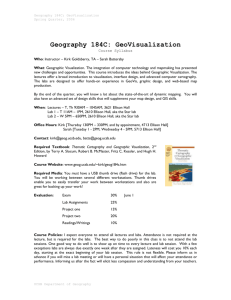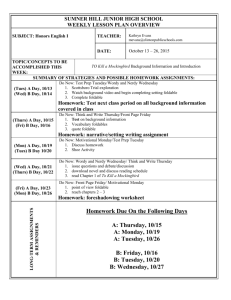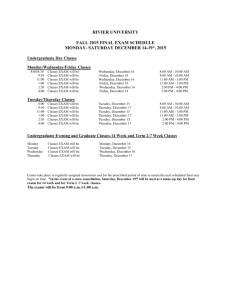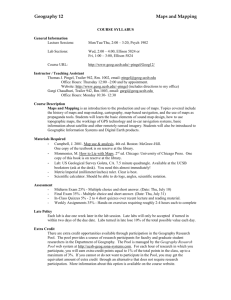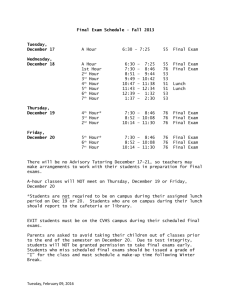SYLLABUS GEOGRAPHY 116/116L
advertisement
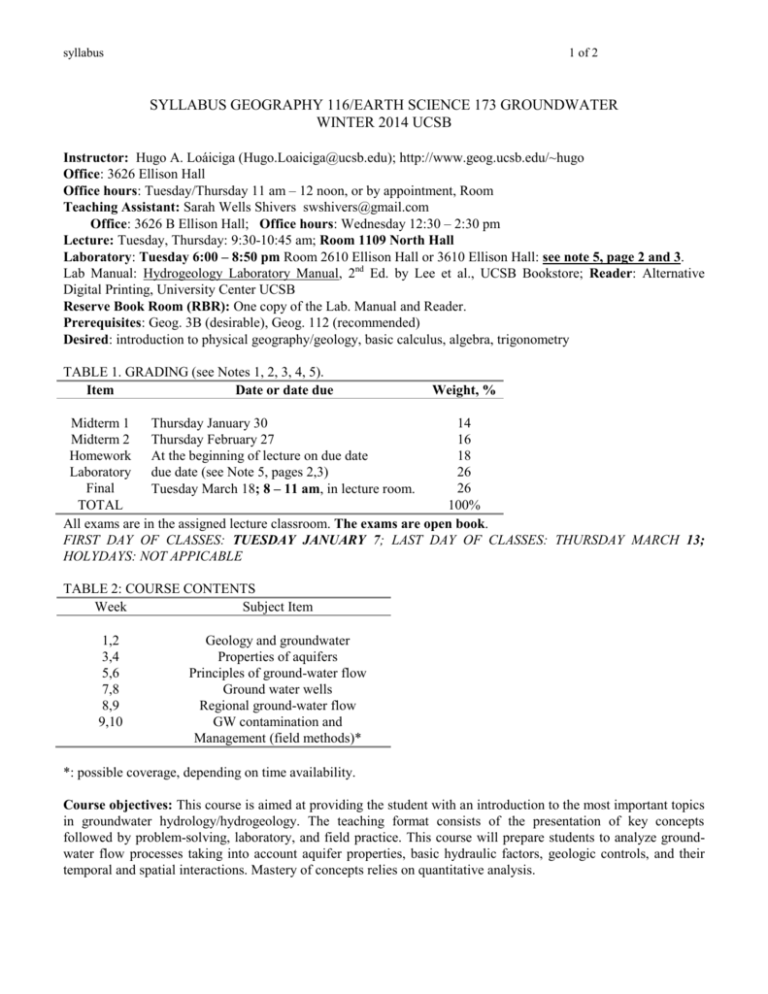
syllabus 1 of 2 SYLLABUS GEOGRAPHY 116/EARTH SCIENCE 173 GROUNDWATER WINTER 2014 UCSB Instructor: Hugo A. Loáiciga (Hugo.Loaiciga@ucsb.edu); http://www.geog.ucsb.edu/~hugo Office: 3626 Ellison Hall Office hours: Tuesday/Thursday 11 am – 12 noon, or by appointment, Room Teaching Assistant: Sarah Wells Shivers swshivers@gmail.com Office: 3626 B Ellison Hall; Office hours: Wednesday 12:30 – 2:30 pm Lecture: Tuesday, Thursday: 9:30-10:45 am; Room 1109 North Hall Laboratory: Tuesday 6:00 – 8:50 pm Room 2610 Ellison Hall or 3610 Ellison Hall: see note 5, page 2 and 3. Lab Manual: Hydrogeology Laboratory Manual, 2nd Ed. by Lee et al., UCSB Bookstore; Reader: Alternative Digital Printing, University Center UCSB Reserve Book Room (RBR): One copy of the Lab. Manual and Reader. Prerequisites: Geog. 3B (desirable), Geog. 112 (recommended) Desired: introduction to physical geography/geology, basic calculus, algebra, trigonometry TABLE 1. GRADING (see Notes 1, 2, 3, 4, 5). Item Date or date due Weight, % Midterm 1 Thursday January 30 14 Midterm 2 Thursday February 27 16 Homework At the beginning of lecture on due date 18 Laboratory due date (see Note 5, pages 2,3) 26 Final 26 Tuesday March 18; 8 – 11 am, in lecture room. TOTAL 100% All exams are in the assigned lecture classroom. The exams are open book. FIRST DAY OF CLASSES: TUESDAY JANUARY 7; LAST DAY OF CLASSES: THURSDAY MARCH 13; HOLYDAYS: NOT APPICABLE TABLE 2: COURSE CONTENTS Week Subject Item 1,2 3,4 5,6 7,8 8,9 9,10 Geology and groundwater Properties of aquifers Principles of ground-water flow Ground water wells Regional ground-water flow GW contamination and Management (field methods)* *: possible coverage, depending on time availability. Course objectives: This course is aimed at providing the student with an introduction to the most important topics in groundwater hydrology/hydrogeology. The teaching format consists of the presentation of key concepts followed by problem-solving, laboratory, and field practice. This course will prepare students to analyze groundwater flow processes taking into account aquifer properties, basic hydraulic factors, geologic controls, and their temporal and spatial interactions. Mastery of concepts relies on quantitative analysis. syllabus 2 of 2 NOTES 1. Attendance to lecture is generally not required. However, there is no note-taking for this class, and homework, laboratory, and test questions depend heavily on lecture notes and instructions. Past experience shows that failure to attend lectures leads to deficient grades in this course. 2. Homework and laboratory reports are due on Thursdays of assigned weeks at the start of lecture, in class, unless otherwise specified by the Instructor. Instructions for homework and laboratory report preparation will be given in class. Turn all due homework to the teaching assistant (T.A.) and reports to the instructor if the T.A. is not present. Late homework and reports are not accepted, and will automatically result in a grade equal to zero. Emailed homework or laboratory reports are NOT acceptable unless there is a valid medical excuse. 3. Make-up exams, homework, reports, and laboratories will not be accepted or administered. Failure to take an exam or submit a scheduled assignment will result in an automatic grade of zero. Under exceptional conditions, a medical condition may entitle a student to a make up a missed test or assignment, provided that a medical certification extended by a licensed physician in the State of California is presented within 48 hours of the scheduled time of the exam or due time of the assignment. The certification must be submitted to the Instructor together with an explanation on how/why the medical condition prevented the student from fulfilling his/her course work. 4. All exams are written, in class, open-book, and to be answered independently by each student. Students are required to bring a battery-powered calculator in good working condition to the exams. No sharing of calculators, information, or other materials is permitted during the exams. Electronic communication devices are NOT accepted during examinations. 5. The laboratory includes: (I) MS EXCEL practice that will prove useful for students in problem solving, homework, and report preparation. This laboratory also includes web browsing of the USGS (United States Geological Survey) public electronic data base. (II) data interpretation and analysis based on the Laboratory Manual by Lee and Fetter, (III) laboratory experimentation with a flow net simulator and a permeameter, (IV) computer analysis of pumping test data, and (V) field practice of spring-flow measurement and spring waterquality testing. See a summary of the laboratory contents and weights, meeting dates and places, report due dates, on TABLE 3. All the laboratory reports are due at the start of lecture on the due date. TABLE 3: summary of the lab. contents and weights, meeting dates and places, report due dates. FOOD AND DRINK ARE NOT ALLOWED IN THE LABORATORIES LABORATORY DATE OF PRACTICE % (I) EXCEL data analysis-training & USGS 1 public web site data base accessing 2 Tuesday Jan. 7, 6 pm Ellison Hall 2610 DUE DATE Thurs. Jan. 16 1 (II) Laboratory manual : II-1: Lab. # 16 (p. 121-126 lab manual) II-2: Lab. # 19-21 (p. 141-144) II-3: Lab. # 8 (p. 59-66) 4 4 4 Tues. Jan. 21, Ellison 2610; 6 pm Tues. Jan. 28, Ellison 2610; 6 pm Tues. Feb. 11, Ellison 2610; 6 pm (III) Lab. Experiment: hydraulic conductivity 3 Tuesday Feb. 25, Ellison 3610; by constant-head permeameter & flownet in 6 – 7 pm 1 a sand tank (IV) Computer analysis of pumping-test 4 Tues. March 4 Ellison 2610; 6 pm 1 data (V) Spring-flow measurement and water 5 Sat. Feb. 8; 10 am- 2:30 pm 1 Meet at 0950, UCSB’s MTD bus stop testing TOTAL: 26 NOTE: 1 Must be present during lab to receive credit in these laboratories. Thurs. Jan. 30 Thurs. Feb. 13 Thurs. Feb. 27 Thursday March 6 Tuesday. March 11 Tuesday Feb. 18
